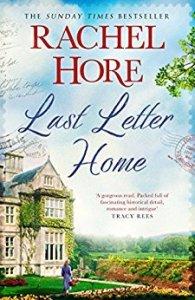
What’s it all about?:
From the bestselling author of A Week in Paris, and the Richard & Judy Bookclub pick A Place of Secrets, comes a gripping and moving story spanning 70 years, set in Italy and in Norfolk.
On holiday with friends, young historian Briony Andrewsbecomes fascinated with a wartime story of a ruined villa in the hills behind Naples. There is a family connection: her grandfather had been a British soldier during the Italian campaign of 1943 in that very area. Handed a bundle of letters that were found after the war, Briony sets off to trace the fate of their sender, Sarah Bailey.
In 1939, Sarah returns with her mother and sister from India, in mourning, to take up residence in the Norfolk village of Westbury. There she forms a firm friendship with Paul Hartmann, a young German who has found sanctuary in the local manor house, Westbury Hall. With the outbreak of war, conflicts of loyalty in Westbury deepen.
When, 70 years later, Briony begins to uncover Sarah and Paul’s story, she encounters resentments and secrets still tightly guarded. What happened long ago in the villa in the shadow of Vesuvius, she suspects, still has the power to give terrible pain.
What did WE think?:
CHRISSI: What were your initial impressions of this book? Did it hook you from the start or did it take you a while to get stuck into the story?BETH: I have to admit, like a lot of books in the past (and very recently!) I judged this book by the cover again. WHY do I keep doing that?! I thought it looked like a bit of a fluffy, contemporary romance which is a genre I’m not really into but I was willing to give it a chance, especially when you told me that you thought I would enjoy it and that it had a historical edge that reminded you of one of my favorite ever books, The Bronze Horseman by Paullina Simons. However, I do have to be honest and say I wasn’t initially hooked by the beginning. When a narrative flows across two time periods, I often find myself preferring the historical tale and this was the same initially speaking, for Last Letter Home too.BETH: In one of the very first scenes, Briony in contemporary times is trolled for some remarks she makes on feminism on a TV show. How do you think this affects her self esteem initially in trying to find information out about her mysterious grandfather?CHRISSI: I think initially, Briony was really knocked by the after effects of the TV show. It takes her a while to get over how she was treated in the aftermath. Trolls are evil and can totally affect your self-esteem and self-worth, so this was utterly relatable. I feel like Briony was quite unstable at the start of the story and deeply affected. However, getting stuck into finding out more information about her grandfather draws Briony out of her shell and begins to give her some self belief. She has determination, that’s for sure.CHRISSI: Do you think the dual timeline worked for this story?BETH: At the beginning, it took a little while for me to get into it. I kept getting the main character in the contemporary time period, Briony messed up with Sarah in the historical period and it took me a little while to get their stories and who they’re involved with in the present time straight in my mind. However, once I had got this sorted, I really enjoyed how the dual time periods told such a fascinating story (from BOTH women’s points of view) and there were certainly secrets revealed that I wasn’t anticipating.BETH: Were you aware at any points of the men “not to trust” and the men “who could be trusted,” in the narrative? Was it interesting to see the parallels between Briony and Sarah’s own lives?CHRISSI: I’m always wary of characters in books which might say something about me. I was sure that Paul could be trusted as he seemed to be such a sweetheart. I loved reading about his interactions with Sarah. I really enjoyed the dual narrative of this story. It was interesting to see how Briony and Sarah shared many qualities with one another. They were both persistent, driven characters in their own time. I also liked how both story lines had elements of betrayal and deceit within them.CHRISSI: Did you have a favorite narrative?BETH: The historical narrative was hands down my favorite narrative. Although its not as overtly romantic as The Bronze Horseman, I can really see why you made that connection. I felt so awful for Sarah and her love interest in the novel, the strange triangle she found herself in and how other people’s attitudes at the time affected how she should be behaving/where she should be looking for a husband. I only wish we had heard more about her younger sister, who I found an incredibly intriguing character.BETH: Sarah and her younger sister both have to deal with death at quite a young age – how do you think they cope with this as individuals?CHRISSI: Good question! Sarah definitely dealt with the death in the family better than her younger sister. Sarah became really supportive towards her family. Sarah’s sister very much closes herself off from talking about death. She appears to be coping less well but I can’t say too much without spoilers! 🙂CHRISSI: Did you feel like the chapters based during WWII were realistic?BETH: I did. It wasn’t overtly graphic but it felt really authentic. It was simply the story of how normal people cope in extraordinary circumstances when food is reduced, danger is prominent and they are forced to live their lives they may not necessarily have imagined living them. One of the stand on scenes in the entire novel for me has to be when Paul is sent away to Italy as part of the war effort and has to witness a very difficult event, something that ends up changing his life forever.
BETH: Would you read another book by this author?
CHRISSI: I think it would depend on the subject matter. I did really enjoy Rachel Hore’s writing and the story was interesting, but she wasn’t an author that I’d read automatically when her book released.
Would WE recommend it?:
BETH: But of course!
CHRISSI: Yes!
BETH’s Star rating (out of 5):

CHRISSI’s Star rating (out of 5):


